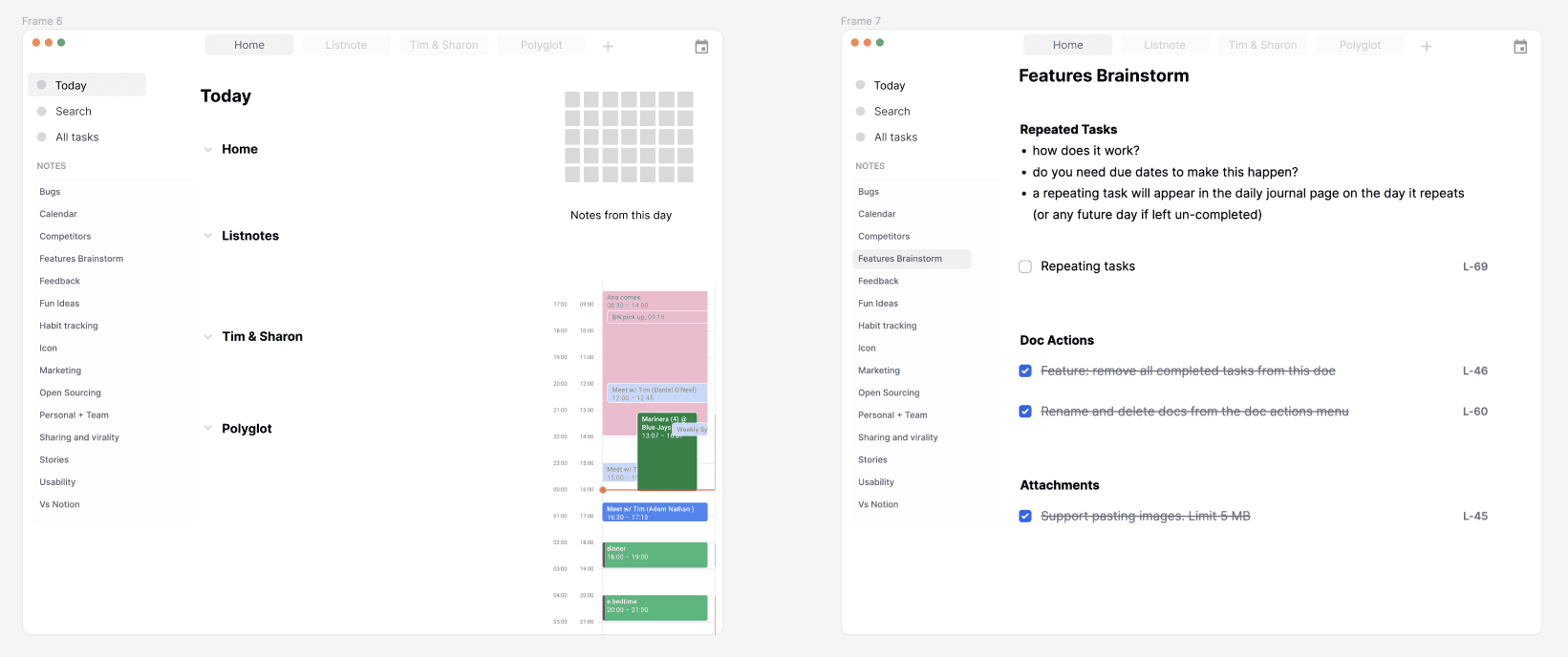Evolving ListNote
How it's changing as I work on it.

ListNote three months in
I started ListNote in July, about three months ago, with the vision of creating a product that combines the power of note taking with the organization of task management. This was a reflection of my workflow that was previously done in Obsidian and before that on paper with a bullet journal.
At the three month mark, I've created what I set out to do: you can write daily and named notes, easily create tasks that tracked in a database, and collaborate on projects with others. I've used the product pretty much daily and have felt more organized because ouf it. It's been stable and free of major bugs for a few weeks.
As I've been building, I've learned a few things about the product and space.
Conversations & Use Case
I've had eight friends use ListNote, all of whom I have reason to believe could benefit from the tool (i.e. they take notes and make tasks). So far, no lives have been changed, no daily engagement habit built, and it doesn't seem like I'm that close to cracking it either. What's interesting is that everyone has been using a different set of tools - Sublime, Bear, Simplenote, Notion, Apple Notes, Google Docs, Obsidian - there really doesn't seem to be a strong common core, and there also isn't a strong pain that would cause switching.
I've also wrestled with the direction to take the project - whether to focus on personal productivity with features like calendar integration and reminders, or project management, with better collaboration, chat, and kanban board.
Competitors
As I've been working on ListNote, I've also been looking at competitors, and there are a lot of them in the Notes + Tasks / Daily Journaling space:
- AmpleNote
- Supernote
- NotePlan
- Agenda
- Elisi
- Grid Diary
- Reflect.app
That's in addition to more project-management oriented tools like Light.tt and Clickup, of which there are also a ton of apps. While having a bunch of competitors isn't necessarily a deal-breaker, it speaks to the difficulty I'm going to have standing out in the space, as many of these are built by bigger teams and pretty much all are subscription businesses.
Where do we go from here
Just this past week I've had a few brainstorming sessions with friends about how to better organize the UX, which has given me some good ideas about how to improve the information architecture. One cool idea is a "Today" page that lets you write notes across all of your projects at the same time to plan out your entire day.

As I've been working on ListNote, it's been a lot of fun, and I feel that there's a lot more that I can do on the product that most of the other products in the space haven't focused on. If I can build a product that makes me super productive, that is inherently valuable, and it may be the case that others also benefit from it.
In particular, I think the problem that I'm solving has become more clear:
Plan your day with calendar, tasks, and journal together
That said, it seems that it's going to be pretty difficult for this product to find product-market fit in a meaningful market given the field of competitors and the diversity of everyone's productivity habits, so I'm going to scale back my effort on ListNote as I focus on Polyglot as a more promising vehicle.
One "bonus" is that ListNote should make a great patient zero for my testing framework, as it's complex but not overly so.
Four Thousand Weeks
I've been reading Four Thousand Weeks, a very different kind of productivity book that helps people come to terms with the finiteness of their life. It's filled with gems like this:
The real measure of any time management technique is whether or not it helps you neglect the right things.
If I can help people be more intentional with their days, that's a win.
Onwards and upwards,
Tim